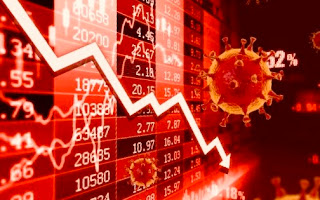Post Coronavirus Global System in 10 Questions ••
With the coronavirus epidemic, the current problems of the global system have become more pronounced. The system's inadequacy in combating the epidemic brought along discussions about the post-virus world order. How will the international system take shape after the coronavirus? What will the new world order be after the epidemic? The clearest prediction to be made for the answer to all these questions is that nothing will be the same anymore.
These days, when we are going through a global epidemic, we are experiencing one of the biggest crises in human history in the last century. We moved from a world where borders disappeared, people, goods, services and capital move freely, to a world where borders were closed physically, travel opportunities disappeared, and people could not leave their homes in just a few weeks. In other words, we remained in a world where mobility only belongs to the virus.
In order to shed light on what happened in the Covid-19 process and the period after, the Center for Strategic Studies of the Ministry of Foreign Affairs prepared a 145-page book titled “Post-COVID-19 Global System: Old Problems, New Trends”. Academicians and experts, whose opinions are included in the book, make evaluations about the coronavirus period we live in, and make predictions and analyzes especially on post-Covid-19 globalization.
As the Green Crescent Magazine, we have compiled this study, which sheds light on the discussions on where the global system will evolve after the epidemic, as a file consisting of 10 questions and 10 answers.
1) How did Covid-19 traumatize the gains of globalization in the last 30 years
In the early 1990s, with the end of the Cold War and the rapid implementation of technologies that shorten the distances, especially in the field of communication and transportation, the world had declared the victory of globalization. Borders would be removed, national economies that were more connected and dependent on each other would flourish, and we would become citizens of a global village. However, globalization was a baby born weak, with a fragile immune system. Over time, two problems emerged that led to this fragility. First, while globalization offered its blessings only to certain segments, the majority of the world's population continued to be deprived of all this. Secondly, while goods, services, capital and people moved faster through global networks, misfortunes such as crime, terror and disease could benefit from the same opportunities and major global problems emerged. However, in the face of the increasing speed of these problems, the ability to bring global solutions to the same problems, to bring collective and therefore sustainable solutions to collective problems, not individually, could not be developed. While globalization is committed to a win-win system to the world, the actors who despaired of it, as it was clearly seen in the trade wars between the USA and China, started to return to zero-sum games by saying "I first".
The Covid-19 pandemic has made these existing problems of globalization even more pronounced, and the king said, "The king is naked." On the one hand, it shows itself in the issues of global inequalities, the spread of the epidemic and the competence to combat the epidemic. On the other hand, the medical supplies aid made between some countries to produce global solutions to global problems and the "Whatever it takes will be done", which emerged at the G20's virtual summit. Except for the result, there is nothing yet. All this brings with it the interpretation that globalization is in a crisis and its end is near.
2) How will the global system take shape after Covid-19
Although the impact of the coronavirus epidemic in the field of health has not yet ended, there are clues about the effects of the epidemic on the global system in the context of combating the virus. Developments in the Covid-19 pandemic showed how fragile the foundations of international cooperation, global governance and international solidarity are in terms of international systems. National borders, which have been tightly closed due to the epidemic, almost zero international travel, and states trying to selfishly confiscate each other's health equipment lead to serious questioning of the phenomenon of globalization.
All these show that there will be serious discussions on the concept of globalization for the post-epidemic period. Although enough reasons have emerged to declare the end of globalization during the pandemic process, radical changes in the international system are not expected in the short term. Although the pandemic is causing a trauma to the global system, it also provides an opportunity to solve the problems that this system is experiencing. Globalization has been taken into intensive care with Covid-19 and will be discharged. When it is discharged, it will be free not only from the virus, but also from the problems that weaken the immune system before the virus.
3) Why did countries adopt the nation state model with the corona epidemic
In the fight against Covid-19, the weakness of the main global actors, namely the USA, China and the European Union, has been seen by their own societies and by the global public.
The inability of individuals and societies in the face of the global disaster experienced with the epidemic has brought the state to the fore as a health, safety and welfare provider. In connection with this, a return to the more traditional, "statist" approach in international relations emerges as a possible phenomenon. We can witness a true return of the state. The state will return not only with its "external protector" identity in the face of threats from terrorism and rising powers in recent years, but also as an "internal protector" defending its citizens. Strong states with a strong administration, reserves, capacity, and institutional readiness to protect their citizens in such times can become ideal. States and institutions will gain importance as ensuring the public safety will be a priority. In a system where people have priority, the answer to the question of who will provide security will inevitably be the state.
The existence of stronger states in international relations will automatically result in a stronger state-centered international system. The more emphasis is placed on nation states and administration, the more state-centered international relations will be. In other words, it is a continuity rather than a transformation. Current practices regarding foreign relations, alliances, cooperation, conflict and diplomacy will continue. The strength of a nation in the new international system will depend on its own domestic success rather than the failures of other states.
4) How will the strengthening nation-state model affect international relations in the post-epidemic period
The coronavirus epidemic continued to spread regardless of nationality, ethnicity, religion, language, socio-economic status. In this process, it has been clearly seen how equal everyone is in fact. Looking at the post-epidemic from this perspective, it can be predicted that the world will have enough motivation to overcome the inequalities that have been artificially constructed so far. As the Covid-19 experience reveals, the phenomenon of "risk society" is happening globally today and includes almost all social institutions. The importance of local, national and global cooperation is undoubtedly important in the restructuring, which will be determined according to the risk areas in question and their importance and degree.
The world has so far not been able to produce collective solutions to its collective problems, including the most fundamental problem such as global warming; because while the majority of people were hurt in the face of a problem, there were parties who benefited from it and had different personal / national priorities. In the face of Covid-19, the situation is different because everyone is losing. Global power USA is currently the country most damaged by the epidemic. Therefore, the priority of everyone is to tackle this epidemic, and this requires international cooperation.
Another point that should be evaluated in terms of international relations is that the issues that left their mark on the international relations agenda shortly before the coronavirus crisis started suddenly fell into the background with the epidemic. Until five months ago, problems such as the Syrian crisis, the Israel-Palestine issue, the US-Iran tension and the Russia-Saudi Arabia oil dispute were discussed, but today there is almost nothing but coronavirus in the world.
5) The spread of the epidemic to the European continent caused turmoil in the European Union. How will the corona transform the EU
During the pandemic process, the break of trust between EU member states and the weaknesses of economic cooperation when it comes to the humanitarian dimension were dramatically revealed. With the coronavirus epidemic, there is almost no trace of "unity" in the European Union regionally. Let alone helping each other, the members even suspended the free movement they had committed with the Schengen Agreement and entered the race to seize each other's aid. Italian far-right League Party leader Matteo Salvini, on the other hand, made a harsh language for the post-coronavirus era, calling for leaving the EU, which does not support them when they need it. In summary, Italy, the country most affected by coronavirus in Europe, is highly likely to enter the process of leaving the EU like the UK after the epidemic, and this may be the beginning of the end for the EU. These and similar developments can trigger serious developments in the Transatlantic (NATO), Mediterranean and Middle East and North Africa (MENA) regions where Italy is one of the important elements.
On the other hand, contrary to this common belief, it can be expected that the post-Covid-19 European Union will turn into a federal structure reinforced with the laws and regulations it will bring from the mistakes made. The biggest support of those who support the view that the EU will continue as a post-epidemic union is the belief that members of the union, who will need all kinds of support in post-epidemic economic restructuring, cannot easily sacrifice EU funds.
6) What kind of changes will the Covid-19 outbreak cause in the position of the main actors in the international system? Will China replace the US
One of the most cursory claims in early evaluations is that the needle will shift in favor of China in the period after Covid-19 in the US-China competition. China's early start and progress as the first pandemic country, of course, provided some advantages to China. In contrast, the American administration's pandemic performance and its inability to effectively protect its citizens from coronavirus as a health provider, despite all its resources, was highly criticized. From this point on, claims that the geopolitical axis of the world is shifting from the West to the East gains strength. On the other hand, the possibility of a global rebound of the USA on the axis of leadership discussions is not ignored. The United States can also use Chinese skepticism, which is widespread in the western world, and if it succeeds in moving beyond the "America First" understanding - which will be the biggest challenge - the upcoming elections will be able to close itself with China in the economic restructuring process of the liberal world.
According to another perspective, an alternative to the world leadership debate on the axis of the USA-China, the coronavirus epidemic has reinforced the problem of "global leadershiplessness". According to this view, the inaction / insufficiency of the global actors expected to take the initiative and lead the process is thought to create a power gap in the international system. From this point of view, an area of action has emerged for the emergence of new actors at the global and regional level.
7) Will there be a change in the post-epidemic roles and effectiveness of international institutions such as the United Nations and the World Health Organization
In the process of Covid-19, the pandemic performance of supranational and multilateral institutions and organizations is far below expectations, which will bring along some existential inquiries towards these institutions and organizations. However, it can be said that these inquiries will lead to revision rather than abolition. In the new period under the effect of coronavirus, it is expected that the contributions from national budgets to international organizations, especially UN specialized organizations, will decrease due to economic problems at the national level. In this context, entering into operation with international organizations deemed strategic in terms of policy actions to ensure the appointment of Turkey and the Turkish administrators in the management of these organizations will increase Turkey's prestige and political influence. The inefficiency and failure of multilateral institutions and organizations in the fight against Covid-19 may open the door to a period in which revision calls such as "The World is greater than 5" will gain more meaning and find more support in the post-crisis atmosphere.
8) After the outbreak of the global and regional role of Turkey will be like
Turkey thanks to both the performance of the state's capacity to fight both koronavirüsl projection, decomposed in the positive sense from many countries. The investments made in the health system, the system being free and accessible, the state and civil society performing an exemplary social solidarity operation during quarantine implementations, the crisis management skills of all decision-makers and relevant institutions, the soundness of the supply chain, citizen evacuation from all over the world, economic packages announced and concrete support to many countries to combat the epidemic outbreak in Turkey said that after the move expands the area compared to many other countries. the country can manage the coming period of change after the big disaster, tendency to be brought into important positions in international organizations personalities in the public and private sectors of Turkey in the near future regional and global structures that will help to improve the representativeness and effectiveness of power.
9) How will the damage caused by the corona epidemic to the economy be felt nationally and internationally
The economy will be one of the most important factors that will determine the post-Covid-19 debates, criticism of the global system and demands for reform. The economic dimensions of the epidemic that we have not yet predicted will cause human mobility, political upheaval and transformations on a global scale. For this reason, those who will manage the revision demands in the post-pandemic global system will be the actors who have the vision and capacity to take responsibility in the global economic restructuring. Considering the negative impact of the coronavirus on national economies, it can be expected that the financial difficulties of countries with fragile economies or political structures, the need for the support of international organizations such as the IMF can be expected to increase. Economic rescue and aid packages similar to the Marshall Plan, which strengthened the anti-Soviet position of the USA and the composition of alliances in the order that emerged after the Second World War, could turn into a tool for states with fragile economies to change their axis or not to change their axis after the pandemic. At this point, the US-China rivalry will be obvious. However, it is possible to claim that states, which have increased their importance in the global supply chain, will increase their effectiveness on a global scale in the post-pandemic period.
10) How will the countries closing their physical borders and this practice will continue after the epidemic affect immigrants
With the coronavirus epidemic, states are expected to follow a stricter immigration policy. Irregular migrants and foreigners settled in that country will be affected the most from this situation. States' rigid immigration policy is likely to find response to other institutions and the public and to create a new wave of xenophobia. Immigrants and foreigners in developing countries are accused of spreading the disease; In developed countries, anti-immigrant groups, which already exist, accuse immigrants of being more irresponsible about the spread of the disease and of creating a burden on the health system. Considering that anti-immigration has increased in times of economic distress, a global increase in anti-immigration can be expected in the future.
On the other hand, it is expected that there will be an increase in anti-Islamic movements against Muslims. In this case, attacks on Muslim groups in European countries, China and especially in India may be less of an issue or ignored. Therefore, in the new era Organization of Islamic Cooperation and other international organizations spearheading the fight against anti-Islamic movement, be able to provide both to extending the benefits to Turkey and Turkey's conscientious stance....
What Does Alcohol Do to the Body? •••














Comments
Post a Comment